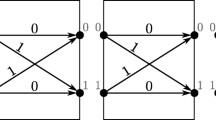Abstract
BDDs and their algorithms implement a decision procedure for Quantified Propositional Logic. BDDs are a kind of acyclic automata. Unrestricted automata (recognizing unbounded strings of bit vectors) can be used to decide more expressive monadic second-order logics. Prime examples are WS1S, a number-theoretic logic, or a string-based notation such as those proposed in some introductory texts. It is not clear which one is to be preferred. Also, the inclusion of first-order variables in either version is problematic since their automata-theoretic semantics depends on restrictions.
In this paper, we provide a mathematical framework to address these problems. We introduce three and six-valued characterizations of regular languages under restrictions. From properties of the resulting congruences, we are able to carry out detailed state space analyses that allows us to solve the two problems in WS1S in a way that require no extra normalization calculations compared to a naive decision procedure for string-oriented logic.
We report briefly on the practical experiments that support our results. We conclude that WS1S with first-order variables is the superior choice among monadic second-order logics.
Chapter PDF
Similar content being viewed by others
References
David Basin and Nils Klarlund. Automata based symbolic reasoning in hardware verification. Formal Methods in System Design, pages 255–288, 1998. Extended version of “Hardware verification using monadic second-order logic,”Computer aided verification: 7th International Conference, CAV’ 95, LNCS 939, 1995.
J.R. Büchi. Weak second-order arithmetic and finite automata. Z. Math. Logik Grundl. Math., 6:66–92, 1960.
Tevfik Bultan, Richard Gerber, and William Pugh. Symbolic model checking of infinite state systems using presburger arithmetic. In Proceedings of the 9th International Conference on Computer Aided Verification (CAV’ 97), volume 1254 of LNCS, pages 400–411. Springer, 1997.
C.C. Elgot. Decision problems of finite automata design and related arithmetics. Trans. Amer. Math. Soc., 98:21–52, 1961.
J.G. Henriksen, J. Jensen, M. Jørgensen, N. Klarlund, B. Paige, T. Rauhe, and A. Sandholm. Mona: Monadic second-order logic in practice. In Tools and Algorithms for the Construction and Analysis of Systems, First International Workshop, TACAS’ 95, LNCS 1019, 1996.
Anders Møller, Jacob Elgaard, Nils Klarlund. Mona 1.x: new techniques for ws1s and ws2s. In Computer Aided Verification, CAV’ 98, Proceedings, volume 1427 of LNCS. Springer Verlag, 1998.
P. Kelb, T. Margaria, M. Mendler, and C. Gsottberger. Mosel: a flexible toolset for Monadic Second-order Logic. In Computer Aided Verification, CAV’ 97, Proceedings, LNCS 1217, 1997.
N. Klarlund. Mona & Fido: the logic-automaton connection in practice. In CSL’ 97 Proceedings. LNCS 1414, Springer-Verlag, 1998.
Nils Klarlund and Anders Møller. MONA Version 1.3 User Manual. BRICS, 1998. URL: http://www.brics.dk/mona.
Thomas R. Shiple, James H. Kukula, and Rajeev K. Ranjan. A comparison of Presburger engines for EFSM reachability. In Computer Aided Verification, CAV’ 98, Proceedings, volume 1427 of LNCS. Springer Verlag, 1998.
Howard Straubing. Finite Automata, Formal Logic, and Circuit Complexity. Birkhäuser, 1994.
Wolfgang Thomas. Languages, automata, and logic. In G. Rozenberg and A. Salomaa, editors, Handbook of Formal Languages, chapter Languages, automata, and logic. Springer Verlag, 1997.
B.A. Trakhtenbrot. Finite automata and the logic of one-place predicates. Sib. Math. J, 3:103–131, 1962. In Russian. English translation: AMS Transl., 59 (1966), pp. 23-55.
Author information
Authors and Affiliations
Editor information
Editors and Affiliations
Rights and permissions
Copyright information
© 1999 Springer-Verlag Berlin Heidelberg
About this paper
Cite this paper
Klarlund, N. (1999). A Theory of Restrictions for Logics and Automata. In: Halbwachs, N., Peled, D. (eds) Computer Aided Verification. CAV 1999. Lecture Notes in Computer Science, vol 1633. Springer, Berlin, Heidelberg. https://doi.org/10.1007/3-540-48683-6_35
Download citation
DOI: https://doi.org/10.1007/3-540-48683-6_35
Published:
Publisher Name: Springer, Berlin, Heidelberg
Print ISBN: 978-3-540-66202-0
Online ISBN: 978-3-540-48683-1
eBook Packages: Springer Book Archive




